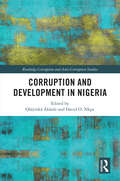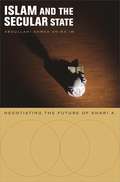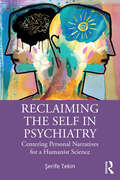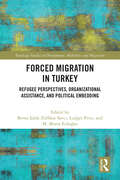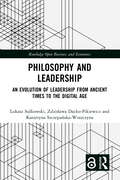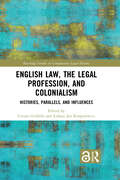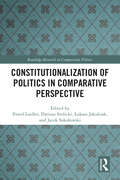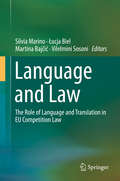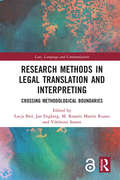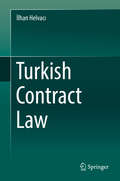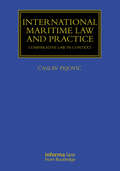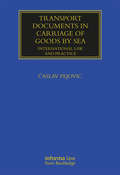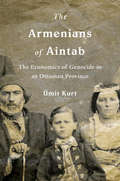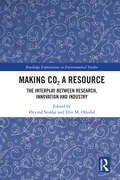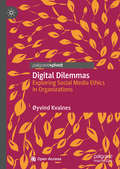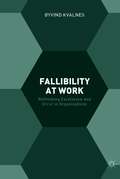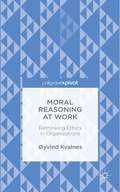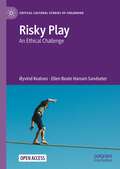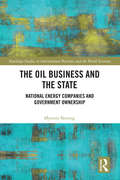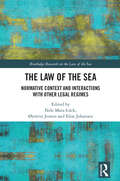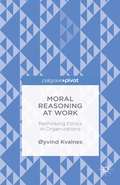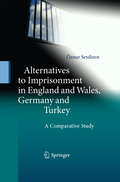- Table View
- List View
Corruption and Development in Nigeria (Routledge Corruption and Anti-Corruption Studies)
by Ọláyínká Àkànle and David O. NkpeDespite being Africa’s largest economy and most populous country, with abundant natural resources, Nigeria still faces substantial development challenges. This book argues that corruption lies at the heart of many of the country’s problems. Drawing on a range of different disciplinary perspectives, this volume explores the relationship between corruption and development, investigating the causes, contexts, and consequences of corruption, and the pathways for addressing it. As well as covering the wider background and theory surrounding corruption in the country, the book will investigate different sectors: the media, the judiciary, the health sector, industry, the criminal justice system, and of course politics and governance. The book concludes by considering attitudes and perceptions to corruption within Nigeria, current approaches to countering corruption, and future pathways to addressing the problem. This book’s critical investigation of the links between corruption and development in Nigeria will be of interest to researchers of corruption, development and African Studies, as well as to policy makers, practitioners, and local stakeholders.
Islam and the Secular State: Negotiating The Future Of Shari`a
by Abdullahi Ahmed Na ʻAbd Allāh NaʻīmWhat should be the place of Shari'a - Islamic religious law - in predominantly Muslim societies of the world? In this book, a Muslim scholar and human rights activist envisions a positive and sustainable role for Shari'a, based on a profound rethinking of the relationship between religion and the secular state in all societies.
Pandemics: Insurance and Social Protection (Springer Actuarial)
by María del Carmen Boado-Penas Julia Eisenberg Şule ŞahinThis open access book collects expert contributions on actuarial modelling and related topics, from machine learning to legal aspects, and reflects on possible insurance designs during an epidemic/pandemic.Starting by considering the impulse given by COVID-19 to the insurance industry and to actuarial research, the text covers compartment models, mortality changes during a pandemic, risk-sharing in the presence of low probability events, group testing, compositional data analysis for detecting data inconsistencies, behaviouristic aspects in fighting a pandemic, and insurers’ legal problems, amongst others.Concluding with an essay by a practicing actuary on the applicability of the methods proposed, this interdisciplinary book is aimed at actuaries as well as readers with a background in mathematics, economics, statistics, finance, epidemiology, or sociology.
Reclaiming the Self in Psychiatry: Centering Personal Narratives for a Humanist Science
by Şerife TekinReclaiming the Self in Psychiatry: Centering Personal Narratives for Humanist Science diagnoses the fundamental problem in contemporary scientific psychiatry to be a lack of a sophisticated and nuanced engagement with the self and proposes a solution—the Multitudinous Self Model (MuSe).MuSe fulfils psychiatry’s twin commitments to patients’ flourishing and scientific objectivity. Marshalling the conceptual and empirical resources from testimonies from individuals diagnosed with mental disorders, substantive research in cognitive science, and empirically informed philosophy, MuSe provides clinicians, scientists, and patients pathways to respond to mental distresses and disorders. This framework boosts psychiatry’s relationship to science by facilitating expansive notions of expertise and objectivity in which some patients are recognized as “experience-based experts” whose contributions to psychiatric knowledge are indispensable. Şerife Tekin draws the contours of a future for psychiatry that is grounded in philosophy, medical humanities, and social sciences as much as physiology and neuroscience.This book is an ideal read for professional psychiatrists and philosophers of psychiatry who are interested in the philosophy of mental health.
Forced Migration in Turkey: Refugee Perspectives, Organizational Assistance, and Political Embedding (Routledge Studies in Development, Mobilities and Migration)
by Ludger Pries Şafak Zülfikar Savcı, Berna M. Murat ErdoğanTurkey hosts more refugees than any other country in the world, with forced migrants from Syria, Afghanistan, Pakistan, Iraq, and other countries converging, either with hopes to settle in Turkey or to continue onwards to the European Union (EU).This volume addresses the specific experiences and trajectories of forced migrants in Turkey in the context of local and national contexts and the future of EU-Turkey relations. It presents the demographics of forced migrants, the biographies and future plans of refugees, and their interactions with civil society, states, and international agencies. A focus is on organized violence and corresponding experiences in countries of origin, during transit, and at current places.Based on extensive quantitative and qualitative research, this book will be of interest to researchers and practitioners in the fields of migration, human security, and refugee studies, as well as of sociology, political sciences, and international relations.
Philosophy and Leadership: An Evolution of Leadership from Ancient Times to the Digital Age (Routledge Open Business and Economics)
by Łukasz Sułkowski Katarzyna Szczepańska-Woszczyna Zdzisława Dacko-PikiewiczPhilosophy and Leadership is an ambitious exploration of leadership's philosophical underpinnings from antiquity to the AI-driven future. The book journeys through history, gleaning insights from eminent philosophers and contextualizing their teachings to leadership.The book's foundational premise lies in the symbiosis of philosophy and leadership. Philosophy provides the "why" that drives the practices and decisions in leadership. This intricate connection is unfolded from the teachings of Confucius on virtue and ethics to the contemporary dialogues of Judith Butler on leadership identity. The book also delves into the evolution of leadership concepts through various eras—medieval times highlighting religious and scholastic perspectives, the Renaissance juxtaposing Machiavellian pragmatism with More's utopian ideals, and the Enlightenment era underscoring the importance of duty, skepticism, and rationality. An exciting aspect of the narrative is the amalgamation of evolution and leadership. By drawing parallels between Darwin's natural selection and leadership dynamics or Bergson's vitalism and intuitive leadership, the authors present a merger of biological evolution with leadership's ever-evolving paradigms. Finally, the concluding chapters reside in envisioning the future and reflect upon the impending synergy between AI and leadership. They emphasize the importance of amalgamating philosophical wisdom with the promises and challenges brought about by AI.The book will guide readers from the philosophical epochs of yore to the AI-predicted leadership paradigms of the future. By intertwining the enduring wisdom of philosophers with the dynamic nature of leadership, this book serves as a beacon for anyone aspiring to lead in any era.
English Law, the Legal Profession, and Colonialism: Histories, Parallels, and Influences (Routledge Studies in Comparative Legal History)
by Cerian Griffiths Łukasz Jan KorporowiczModern legal history is increasingly interested in exploring the development of legal systems from novel and nuanced approaches. This edited collection harnesses the lesser-researched perspectives of the impact of global and imperial factors on the development of law. It is argued that to better understand these timely discussions, we must understand the process and significance of colonisation itself. The volume brings together experts in the field of law and history to explore the ways in which law and lawyers contributed to the expansion of the British Empire, and the ways in which the Empire influenced the Metropole. The book sheds new light on the role of the law and legal actors during the pivotal centuries that saw the establishment of the Empire. Exploring such topics as Atlantic relations, the impact of British jurists upon Indian law, and the development of the law settler colonies, this collection reveals some of the lesser-known intersections between law, history, and empire. The book will be of interest to students and researchers in legal history, comparative history, equity and trusts, contract law, the legal profession, slavery, and the British Empire.
English Law, the Legal Profession, and Colonialism: Histories, Parallels, and Influences (Routledge Studies in Comparative Legal History)
by Cerian Griffiths Łukasz Jan KorporowiczModern legal history is increasingly interested in exploring the development of legal systems from novel and nuanced approaches. This edited collection harnesses the lesser-researched perspectives of the impact of global and imperial factors on the development of law. It is argued that to better understand these timely discussions, we must understand the process and significance of colonisation itself. The volume brings together experts in the field of law and history to explore the ways in which law and lawyers contributed to the expansion of the British Empire, and the ways in which the Empire influenced the Metropole. The book sheds new light on the role of the law and legal actors during the pivotal centuries that saw the establishment of the Empire. Exploring such topics as Atlantic relations, the impact of British jurists upon Indian law, and the development of the law settler colonies, this collection reveals some of the lesser-known intersections between law, history, and empire. The book will be of interest to students and researchers in legal history, comparative history, equity and trusts, contract law, the legal profession, slavery, and the British Empire.
Constitutionalization of Politics in Comparative Perspective (Routledge Research in Comparative Politics)
by Paweł Laidler Dariusz Stolicki Łukasz Jakubiak Jacek SokołowskiScholars from political science and law examine the latest research on the constitutionalization of politics in comparative perspective.The scope includes both inter- country and intra- country perspectives, institutional and systemic analyses, common and civil law systems, focusing on historical and contemporary case studies. There are chapters limited to a concrete legal and political system, analyzing the tools and processes guarding constitutionalization of politics in such countries as the United States, Germany, France, Italy, Poland, Finland, and Bulgaria, as well as studies offering comparative analysis of various institutions representing different countries and different legal and political systems. Taken together, this book uncovers a wide variety of legal and political cultures, systems of governments, and forms of territorial organization. Once uncovered, this approach makes it easier to determine repetitive patterns which may be observed in constitutional review and constitutional interpretation, or significant differences occurring in the models of constitutionalization of politics around the world.Constitutionalization of Politics in Comparative Perspective tackles important debates among academics interested in the theoretical and practical aspects of constitutions and constitutionalism and will appeal to social scientists, including sociologists, philosophers, security studies and international relations experts but also cultural studies scholars.
Economics Without Laws: Towards a New Philosophy of Economics
by Łukasz HardtThis book offers a vision of economics in which there is no place for universal laws of nature, and even for laws of a more probabilistic character. The author avoids interpreting the practice of economics as something that leads to the formulation of universal laws or laws of nature. Instead, chapters in the book follow the method of contemporary philosophy of science: rather than formulating suggestions for practicing scientists of how they should do research, the text describes and interprets the very practice of scientific research. This approach demonstrates how economists can explain economic phenomena not by subsuming them under general laws, but rather by building models of these phenomena, by referring to causes, or even by investigating what is in the nature of given factors, events, or circumstances to produce.
Language and Law: The Role Of Language And Translation In Eu Competition Law
by Silvia Marino Łucja Biel Martina Bajčić Vilelmini SosoniThe book provides an overview of EU competition law with a focus on the main developments in Italy, Spain, Greece, Poland and Croatia and offers an in-depth analysis of the role of language, translation and multilingualism in its implementation and interpretation.The first part of the book focuses on the main developments in EU competition law in action, which includes legislation, case law and praxis. This part can be divided into two subparts: the private enforcement of EU competition law, and the cooperation among enforcers, i.e. the EU Commission, the national competition authorities and the national courts. Language is of paramount importance in the enforcement of EU competition law, and as such, the second part highlights legal linguistic skills, showcasing the advantages and the challenges of multilingualism, especially in the context of the predominant use of English as the EU drafting and vehicular language.The volume brings together contributions prepared and presented as part of the EU-funded research project “Training Action for Legal Practitioners: Linguistic Skills and Translation in EU Competition Law".
Research Methods in Legal Translation and Interpreting: Crossing Methodological Boundaries (Law, Language and Communication)
by Łucja Biel Vilelmini Sosoni Jan Engberg Rosario Martín RuanoThe field of legal translation and interpreting has strongly expanded over recent years. As it has developed into an independent branch of Translation Studies, this book advocates for a substantiated discussion of methods and methodology, as well as knowledge about the variety of approaches actually applied in the field. It is argued that, complex and multifaceted as it is, legal translation calls for research that might cross boundaries across research approaches and disciplines in order to shed light on the many facets of this social practice. The volume addresses the challenge of methodological consolidation, triangulation and refinement. The work presents examples of the variety of theoretical approaches which have been developed in the discipline and of the methodological sophistication which is currently being called for. In this regard, by combining different perspectives, they expand our understanding of the roles played by legal translators and interpreters, who emerge as linguistic and intercultural mediators dealing with a rich variety of legal texts; as knowledge communicators and as builders of specialised knowledge; as social agents performing a socially situated activity; as decision-makers and agents subject to and redefining power relations, and as political actors shaping legal cultures and negotiating cultural identities, as well as their own professional identity.
Turkish Contract Law
by İlhan HelvacıThis book introduces readers to the main principles of Turkish contract law, and particularly analyzes the general provisions of the Turkish Code of Obligations. Moreover, in order to illuminate certain key subjects, it discusses selected provisions of the Turkish Civil Code, the Turkish Commercial Code and the Turkish Bankruptcy and Enforcement Law.Intended to provide a comprehensive and clear overview of Turkish contract law, the book seeks to avoid contentious arguments and explains the subjects with the help of simple examples.
International Maritime Law and Practice: Comparative Law in Context (Maritime and Transport Law Library)
by Časlav PejovićThis book provides a different perspective on the ever-popular topic of maritime law, emphasising historical and comparative aspects. It provides the reader with a broader view of how maritime law has developed throughout history and operates within various legal systems. Each chapter starts with historical development, meticulously explaining the development of various maritime law concepts to enable a higher level of understanding in the contemporary context.The text adopts a comprehensive comparative approach that has two segments. One segment is related to the coverage of several major maritime jurisdictions. Focusing mainly on English law, it also provides selected legislation and essential case law information from several other jurisdictions (US, France, Germany, Italy, Japan, China, etc), many of which are not easily accessible in English. The other relates to the comparison between common law and civil law on a general level.This book will be of significant interest to lawyers working in shipping companies, law firms specializing in shipping, international organizations related to shipping and maritime law, and international traders. It also provides invaluable aid to shipmasters and ship officers, empowering them with the knowledge to effectively deal with various maritime law issues in their professional activities. The book's content will be of direct relevance to maritime law scholars and students, enhancing their understanding of this complex field.
Transport Documents in Carriage Of Goods by Sea: International Law and Practice (Maritime and Transport Law Library)
by Časlav PejovićBringing a fresh, comparative approach to transport documents used in the carriage of goods by sea, this book covers bills of lading, sea waybills, ship’s delivery orders, multimodal transport documents, and electronic transport documents. The book covers historic developments, current conventions, and thoughts for the future on these transport documents; and delves deeply into the legal issues concerning them. It represents a comprehensive compilation of case and statute law from around the world on this subject. In addition to English law, the book covers American, French, German, and Italian laws, as well as the laws of several East Asian jurisdictions (China, Japan, South Korea). Primarily, the book will be of use to maritime law scholars and students, and lawyers who deal with shipping. It may also be of interest to international traders, banks, and ship masters and officers.
The Armenians of Aintab: The Economics of Genocide in an Ottoman Province
by Ümit KurtA Turk’s discovery that Armenians once thrived in his hometown leads to a groundbreaking investigation into the local dynamics of genocide. Ümit Kurt, born and raised in Gaziantep, Turkey, was astonished to learn that his hometown once had a large and active Armenian community. The Armenian presence in Aintab, the city’s name during the Ottoman period, had not only been destroyed—it had been replaced. To every appearance, Gaziantep was a typical Turkish city. Kurt digs into the details of the Armenian dispossession that produced the homogeneously Turkish city in which he grew up. In particular, he examines the population that gained from ethnic cleansing. Records of land confiscation and population transfer demonstrate just how much new wealth became available when the prosperous Armenians—who were active in manufacturing, agricultural production, and trade—were ejected. Although the official rationale for the removal of the Armenians was that the group posed a threat of rebellion, Kurt shows that the prospect of material gain was a key motivator of support for the Armenian genocide among the local Muslim gentry and the Turkish public. Those who benefited most—provincial elites, wealthy landowners, state officials, and merchants who accumulated Armenian capital—in turn financed the nationalist movement that brought the modern Turkish republic into being. The economic elite of Aintab was thus reconstituted along both ethnic and political lines. The Armenians of Aintab draws on primary sources from Armenian, Ottoman, Turkish, British, and French archives, as well as memoirs, personal papers, oral accounts, and newly discovered property-liquidation records. Together they provide an invaluable account of genocide at ground level.
Making CO2 a Resource: The Interplay Between Research, Innovation and Industry (Routledge Explorations in Environmental Studies)
by Elin M. Oftedal Øyvind StokkeThis interdisciplinary book explores how CO2 can become a resource instead of a waste and, as such, be a tool to meet one of the grandest challenges humanity is facing: climate change.Drawing on a Norwegian narrative that has significance for a global audience, Øyvind Stokke and Elin Oftedal introduce in-depth, multi-perspective analyses of a sustainable innovation research experiment in industrial carbon capture and utilisation technologies. Building on extensive literature within marine sciences, sustainability research, and environmental philosophy and ethics, this book documents how a misplaced resource like CO2 can become valuable within a circular economy in its own right, while at the same time meeting the challenge of food security in a world where food production is increasingly under pressure. The book is diverse in scope and includes chapters on how to reduce the environmental footprint of aquaculture by replacing wild fish and soy from the Amazon, how to optimise the monitoring of aquatic environments via smart technologies, and how to replace materials otherwise sourced from natural environments. The authors also analyse the pivotal role of the university in driving innovation and entrepreneurship, the pitfalls of different carbon technologies, and explore how the link between petroleum dependence and CO2 emissions has been addressed in Norway specifically.Making CO2 a Resource will be of great interest to students and scholars of climate change, environmental ethics, environmental philosophy, sustainable business and innovation, and sustainable development more broadly.
Digital Dilemmas: Exploring Social Media Ethics in Organizations
by Øyvind KvalnesSocial media is at the core of digital transformations in organizations. Facebook, Twitter, LinkedIn, and other social media platforms widen the scope for rapid and effective communication with stakeholders. They also create a range of new and challenging ethical dilemmas.This open access book categorizes the dilemmas organizations across a range of industries can face when they implement social media to communicate with stakeholders. This book provides a systematic framework for analyzing these ethical dilemmas in social media using the Navigation Wheel. This tool leads the decision-maker through a series of considerations such as legal questions, corporate identity, morality, reputation, and ethics. Finally, the author considers implications for leaders and presents potential solutions to these dilemmas. Based on five years of original research with 250 executive students at a European business school, all of whom work with social media communications in their organizations, this book is the first major study to explore the ethical use of social media across industries and is a valuable resource for researchers and practitioners alike.
Fallibility at Work: Rethinking Excellence and Error in Organizations
by Øyvind KvalnesThis book is published open access under a CC BY 4.0 license. This book addresses how organizations can deal with human fallibility in order to create space for excellence at work. Some mistakes in work settings put lives at risk, while others create openings for innovative breakthroughs. In order to deal constructively with fallibility, an organization needs a communication climate where it is normal to voice opinions, admit mistakes, and ask for help in critical situations. The book builds on interviews with practitioners in healthcare, aviation, IT, public governance, and industry. It connects narratives from these fields with theories from organizational psychology and philosophy, as well as from positive organizational scholarship. In the final chapter, an overall ethics of fallibility at work is outlined. Fallibility at Work contributes to research in multiple academic disciplines, but also reaches out to practitioners who are interested in the connections between error and excellence in organizations.
Risky Play: An Ethical Challenge (Critical Cultural Studies of Childhood)
by Øyvind Kvalnes Ellen Beate Hansen SandseterThis open access book brings together current childhood research and contemporary ethical theory to draw attention to how children depend upon a scope of action for risky play for their mental and physical development. In many countries, the opportunities for children to play away from adults' close attention have decreased. At both school and home, protection and avoidance of harm take increasing priority. This book draws a distinction between do-good ethics and avoid-harm ethics to highlight ethical tensions and dilemmas encountered by professionals who work with children, and suggests better ways to balance these ethical dimensions in approaching risky play.
The Oil Business and the State: National Energy Companies and Government Ownership (Routledge Studies in International Business and the World Economy)
by Øystein NorengNational oil companies are big business with about 80 percent of the world’s proven oil reserves, and they are crucial to the world’s energy supplies. They are giants, some of the world’s largest companies, measured by market capitalisation, cash flow and investment. Little is known about their modus operandi, how they make decisions about investment and production or about relations with their government-owners. However, it is known that they conduct business with a political mandate, often with multiple long-term objectives, broadly defined and hard to quantify. Unclear mandates give national oil companies leeway to pursue their own distinctive interests, apart from those of the government-owner. As investors, governments are less zealous than private investors. They generally observe multiple objectives, not only return on capital. Therefore, the senior management of national oil companies enjoy more discretionary power and consider longer time horizons than their counterparts in the private sector. The Oil Business and the State explains the practice of state ownership in a capital-intensive industry with high risks and high return, and how these companies act in a market with imperfect competition. This book looks to give readers more insight into the oil industry, into the background of oil exporting countries as well as the economic and political challenges confronting them, including problems of state ownership. The book discusses wider consequences of China replacing the United States as the world’s leading oil importer. It will be of interest to researchers, academics and students in the fields of international business, management history, corporate governance, political economy and economic development of oil-rich countries.
The Law of the Sea: Normative Context and Interactions with other Legal Regimes (Routledge Research on the Law of the Sea)
by Øystein Jensen Elise Johansen Nele Matz-LückThe United Nations Convention on the Law of the Sea follows a comprehensive approach and can be interpreted dynamically to include the regulation of all potential human uses of the ocean, but the law of the sea cannot be viewed in isolation from other fields of international law. International law does not resemble a hierarchically structured legal system; its different parts interact when different rules address the same activity or situation. The academic discussion concerning the specialization and proliferation of international legal rules and dispute settlement bodies has theoretical as well as practical relevance for the law of the sea and its interaction with other parts of international law. The intensified use of the oceans for different purposes and the ongoing proliferation of international rules addressing different activities from different perspectives and with distinct foci require a more thorough evaluation of how the law of the sea relates to other fields of international law, how the normative context can be approached theoretically and if interdisciplinary interfaces can be adequately addressed. This book discusses the normative context of the law of the sea and the interactions of the law of the sea with other legal regimes. By connecting high-quality research with new ideas and perspectives, this book offers expertise from different fields and perspectives in which the interaction between the law of the sea and other fields of international law becomes particularly relevant.
Moral Reasoning at Work: Rethinking Ethics In Organizations
by Ø. KvalnesThis book is open access under CC-BY license. Moral dilemmas are a pervasive feature of working life. Moral Reasoning at Work offers a fresh perspective on how to live with them using ethics and moral psychology research. It argues that decision-makers must go beyond compliance and traditional approaches to ethics to prepare for moral dilemmas.
Alternatives to Imprisonment in England and Wales, Germany and Turkey: A Comparative Study
by Öznur SevdirenThe book focuses on one of the most problematic areas of Turkish penal justice: the overreliance on custodial measures and a corresponding growth in the prison population, and compares Turkey with two major European countries in this respect: England and Wales and Germany. The underlying question throughout the study is the extent to which prison alternatives can be seen as genuine alternatives to immediate custodial sentences.
